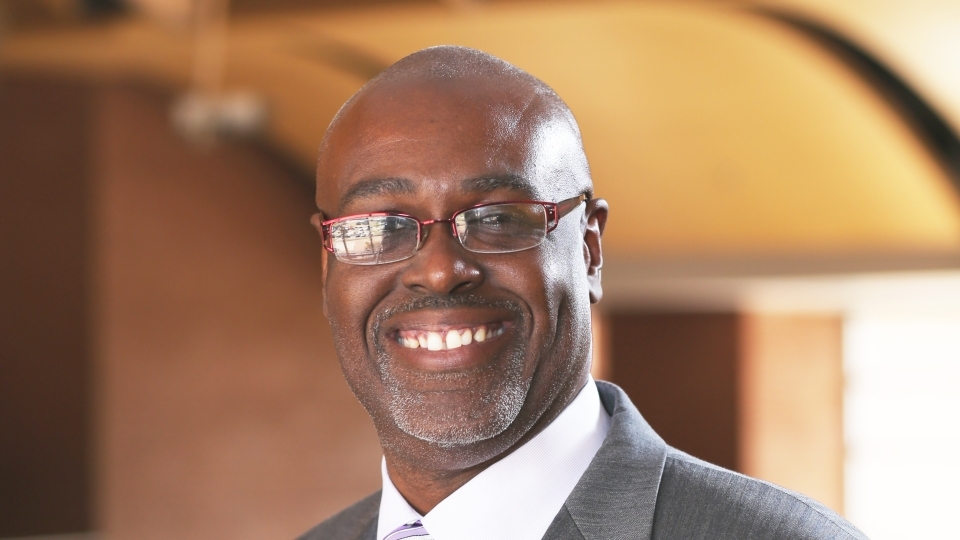Alumni Voices: Marino ‘Tony’ Bruce ’89 Connects Science, Religion and Health
November 2, 2020
- Author
- Danielle Strickland

Marino “Tony” Bruce ’89
Faith and medicine sometimes clash, such as religious groups that eschew modern health care. At best, they can awkwardly co-exist. If either prayer or prescriptions can cure, is the other needed?
Marino “Tony” Bruce ’89, man of faith and behavioral scientist, not only says ‘yes,’ but that faith and medicine go hand in hand.
When Bruce first arrived at Davidson, he joined only about 50 African American students on campus. He played football, and he felt his professors and fellow students saw him only as an athlete. Despite the struggle to feel seen as a scholar by teachers and peers, Davidson courses helped direct his interests toward African Americans’ experiences through history.
His focus crystallized in grad school, when he began studying how race and other forms of inequality affected the health and well-being of young African American males.
“I wanted to know what race means and how it perpetuates inequality,” Bruce said. “I wanted to understand how risky behavior can be a function of one’s environment and how person-environment interaction affects upward or limited mobility.”
Black Americans have higher rates of diabetes, hypertension and obesity—all risk factors for worse outcomes from COVID-19, which has exposed the glaring health disparities caused by systemic racism.
And Black males are more likely to die from violence before age 21, compared to every other population.
“If they survive to be young adults, chronic kidney disease and cardiovascular disease are waiting around the next corner,” Bruce said. “So, what’s going on there?”
Following graduate school, Bruce, who has graduate training in rehabilitation counseling, became an ordained Baptist minister.
He initially resisted ministry because he comes from a family of religious leaders. His grandfather was a deacon for 50 years, and his father was called into the ministry after serving as a deacon for 20 years. He and his sister began ministerial journeys approximately at the same time, but Bruce knew his spiritual path was different.
“My calling was never to traditional church ministry like my father and sister,” he said. “It took a while for me to find my place as one who is called to study and demonstrate that faith and its practice has tangible mental and health benefits.”
He has served on ministerial staffs for the past two decades, and these insights provided inspiration for research connecting faith practice with life expectancy.
“There is an association between religious service attendance and lower mortality rates among all groups—men and women,” Bruce said. “I’m now diving into how weekly religious service attendance is connected to reducing risk of mortality for those with chronic kidney disease. Demonstrating an association is not enough; we have to learn more.”
Bruce and his research collaborators have found it’s not about which faith or how people choose to express their faith that matters. What matters is that they do it. Bruce is Baptist, but he also has studied physical health connections in Judaism, Islam, Buddhism and Taoism, among other faiths.
“We’re combining areas often at odds,” Bruce said. “In Eastern cultures, science and religion can operate together. Religion and spirituality provide emotional resources. It’s about a higher being, something bigger than any individual. Historical research notes that religion and medicine have been linked for millennia, and the two have only been separated for the most recent three centuries.”
The connection still exists, Bruce said. It is not uncommon for faith communities, especially in the South, to pray for patients and their entire health care team.
Bruce, a social and behavioral scientist, works as a professor, director of faculty development and director of the Program for Research on Faith, Justice and Health at the University of Mississippi Medical Center. He holds a doctoral degree in sociology and master’s degree in divinity and rehabilitation counseling.
The liberal arts perspective Bruce gained at Davidson has guided him through his research in ways he could not predict when he was a student. The Davidson environment was socially, psychologically and emotionally challenging; but its scholarly culture and rigor fueled his intellectual curiosity, energy and boldness. Mentors like the late Rev. Brenda Tapia, who joined Davidson during Bruce’s sophomore year, helped him to survive the tension.
“Staff members poured into the African American students on campus,” Bruce said. “We were largely invisible in those years, still among the first cohorts trying to get through. It was not easy, but I would do it all over again today because it’s important to push through pain to receive the promise described in sacred spiritual texts. If Davidson continues to stand on principles of justice, empathy and passion, this institution can be a beacon for others.”



